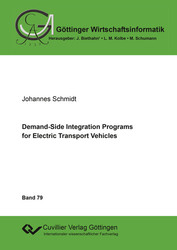| Fachbereiche | |
|---|---|
| Buchreihen (97) |
1382
|
| Nachhaltigkeit |
3
|
| Gesundheitswesen |
1
|
| Geisteswissenschaften |
2372
|
| Naturwissenschaften |
5408
|
| Mathematik | 228 |
| Informatik | 320 |
| Physik | 980 |
| Chemie | 1364 |
| Geowissenschaften | 131 |
| Humanmedizin | 243 |
| Zahn-, Mund- und Kieferheilkunde | 10 |
| Veterinärmedizin | 108 |
| Pharmazie | 147 |
| Biologie | 835 |
| Biochemie, Molekularbiologie, Gentechnologie | 121 |
| Biophysik | 25 |
| Ernährungs- und Haushaltswissenschaften | 45 |
| Land- und Agrarwissenschaften | 1005 |
| Forstwissenschaften | 201 |
| Gartenbauwissenschaft | 20 |
| Umweltforschung, Ökologie und Landespflege | 148 |
| Ingenieurwissenschaften |
1798
|
| Allgemein |
98
|
|
Leitlinien Unfallchirurgie
5. Auflage bestellen |
|
Erweiterte Suche
Demand-Side Integration Programs for Electric Transport Vehicles (Band 79)
Johannes Schmidt (Autor)Vorschau
Inhaltsverzeichnis, PDF (54 KB)
Leseprobe, PDF (170 KB)
Applying demand-side integration (DSI) programs for electric vehicles (EVs) is important for improving system reliability and assisting in integrating renewables into the energy system. At the same time, EV users are attracted to DSI programs due to their financial benefits. An application context for applying DSI programs for EVs that has not yet been investigated but seems to hold great potential is heavy-duty electric transport vehicles (ETVs) operating in closed transport systems. A particularly favorable characteristic in this area of application is the possibility of pooling these vehicles – each with a considerable battery storage capacity – on company grounds. This cumulative dissertation primarily aims to identify and assess feasible and suitable DSI programs for an ETV fleet. To ensure the practical relevance of the results, the analyses were based on a large-scale electric mobility. It was found that the load-shifting potential of the ETV fleet can be used for a broad range of DSI programs, the most promising of which resulted in a significant potential for cost saving (>30%) compared to uncontrolled charging. Furthermore, the analyses reveal that an ETV fleet can be more profitable than a comparable diesel-powered one. Overall, the results have the potential to convince further fleet operators to use ETVs and adopt DSI solutions, which is crucial for shaping a sustainable transport and energy sector.
| ISBN-13 (Printausgabe) | 9783736991231 |
| ISBN-13 (E-Book) | 9783736981232 |
| Buchendformat | A5 |
| Sprache | Deutsch |
| Seitenanzahl | 204 |
| Umschlagkaschierung | glänzend |
| Auflage | 1. Aufl. |
| Buchreihe | Göttinger Wirtschaftsinformatik |
| Band | 79 |
| Erscheinungsort | Göttingen |
| Promotionsort | Göttingen |
| Erscheinungsdatum | 13.10.2015 |
| Allgemeine Einordnung | Dissertation |
| Fachbereiche |
Informatik
|








